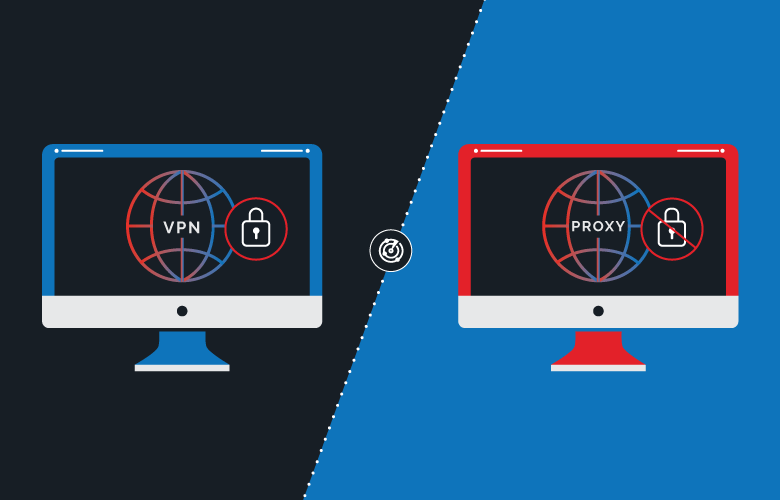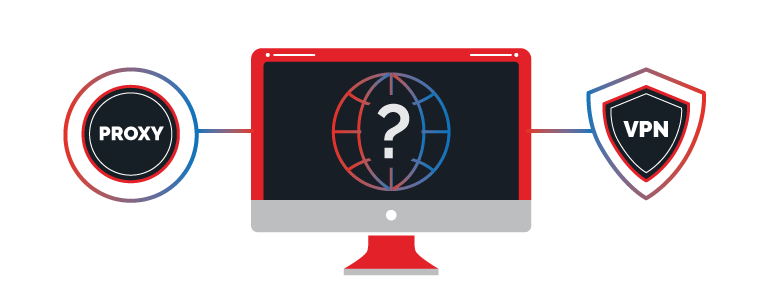October 4, 2021
Best Privacy Tools of April 2025: A Complete Guide
In the words of Edward Snowden in his memoir Permanent Record: “ Saying that you don't care about [...]

WHAT’S IN THIS REVIEW?
Disclaimer: Partnerships & affiliate links help us create better content. Learn how.
What’s the difference between a VPN and a proxy, and aren’t they basically the same thing? Well, they often get lumped together when talking about online security, but they’re used for a variety of different tasks.
Both serve as a decent entry point for increased privacy, which is becoming more important for the average user, although there are significant differences to consider. In any case, either a proxy or a VPN will be helpful if you want to protect your identity or access blocked content.
This guide will take you through the basics surrounding VPNs vs proxies, giving you a better idea of what to expect from their varying levels of protection. You will also be able to separate the two and understand which will serve your needs best.
Proxies and VPNs will allow for improved levels of privacy, but the methods they use to do so are different. The same is true for the level of protection they provide, with the latter seen as a more secure option. Either only takes a few clicks of a mouse to set up and start, and there are a few distinct similarities.
We’ll get into that below, but first, we’ll take you through the basics, as well as the pros and cons each service provides.

A virtual private network (VPN) replaces your ISP routing, establishing a secure tunnel that encrypts your network traffic. In layman’s terms, they encrypt and secure any data sent to and from your device, ensuring it’s safe from prying eyes. This data is then disposed of, for anonymity and privacy purposes. (Well, ideally, but that’s not always the case.)
This service works by connecting your device to a VPN server, which can be found anywhere in the world. For example, a UK server would give access to British websites, by giving the user a UK IP address to connect to the internet with.
VPNs come in many forms, from barebones services with a handful of servers to premium providers that have partnered with football teams to improve recognition. Most importantly, in comparison to a proxy, a VPN connection routes and encrypts all of your network traffic.
Every VPN will come with certain quirks depending on what users it’s created for. However, on the whole, most providers offer similar pros and cons you should consider before pulling out your credit card. Here are the main points:

Rather than the all-encompassing protection offered by a VPN, a proxy is typically used to unblock websites or browse anonymously.
A proxy is used to translate traffic between networks or protocols. This is done with a server that often adds functionality, be it via added security or improved performance.
In relation to VPNs, proxy servers change your IP address, redirecting your traffic to another server. This means that you’ll be able to unblock websites or services since the connection will appear to come from a different location than your own. However, this traffic isn’t encrypted to the same level as with a VPN. Many proxies work within the browser, either charging for use of the service or making money through advertising.
To put it simply, instead of directly connecting to a website, your computer will send web traffic to the proxy server first. The proxy forwards your request to the website, which causes the traffic to appear to come from their server location, rather than your device.
There are various types of proxies depending on what task you have at hand. If you were aiming to avoid an IP ban, a rotating proxy is a server that assigns a new IP address for every connection made. With a rotating proxy, you could launch a script to send 10,000 requests to any number of sites and get as many different IP addresses.
A more fundamental example of a proxy server can be found in many office networks. In addition to forwarding traffic, they may act as a firewall and web filter, or provide shared network connections for increased usability.
While proxies don’t encrypt your data like VPNs can, they still come in handy for a handful of tasks. Below we break down the pros and cons to help you decide if a proxy is right for you.
| VPN | Proxy |
| Freemium/Premium software | Free to use (some premium options) |
| Privacy-focused | For unblocking websites |
| Encrypts all traffic | Encrypted web traffic |
| Multiple apps/websites | One website/app at a time |
| Client apps | Web Based |
| Audited services | Potential to log user data |
| VPN | Freemium/Premium software |
| Proxy | Free to use (some premium options) |
| VPN | Privacy-focused |
| Proxy | For unblocking websites |
| VPN | Encrypts all traffic |
| Proxy | Encrypted web traffic |
| VPN | Multiple apps/websites |
| Proxy | One website/app at a time |
| VPN | Client apps |
| Proxy | Web Based |
| VPN | Audited services |
| Proxy | Potential to log user data |
It’s easy to see how VPNs and proxies get lumped together, but the differences are clear. A VPN tends to be a premium service with a subscription fee. Proxies are generally free to use, but that does mean that they could be selling user data. Also, they will both unblock websites and services, but a solid VPN is more likely to do so consistently.
The most important difference is that a proxy will encrypt web traffic, typically for one website or app at a time. A VPN encrypts all traffic, which is better from a security standpoint. You’ll also be able to use the majority of VPNs on multiple devices, whether desktop or mobile.
VPNs offer a range of additional features, and in many ways, it’s like using a proxy on steroids. The security is enhanced, speeds will be improved, and the majority have native apps for every major platform.
Is there any point in doubling up with a VPN and a proxy? Not really, as a VPN should offer everything you’d expect from a proxy server – and then some.
A VPN will also override any proxy settings. This means that a VPN can be used to bypass a proxy server or firewall. A combination of the two would probably have an impact on connection speeds, so we’d stick with a proxy if you just want to unblock a website and a premium provider like NordVPN if you’d prefer true anonymity.

If you face the choice between a free VPN vs a free proxy, we’d always opt for the latter if you want to access a website or two.
It’s likely to be more of a basic experience, but you won’t be upsold or limited to the extent you’ll find with the majority of free VPN services. However, be wary of the websites you visit as your data could be sold to advertisers or other third parties worth paying. For more comprehensive coverage, we’d stick with a paid and trustworthy VPN service.
If you can’t decide either way, we recommend going with Tor (The Onion Router). Tor is a free web browser that offers good security when accessing websites. It routes your data through three different servers before returning any searches, although this does come at the expense of slower speeds. Due to the nature of the relayed connections, you can expect poorer performance compared to a VPN. Yet, it is free – which counts for a lot to some users.
Before exiting, let’s recap what we’ve covered.
A proxy is a handy online tool that helps the user to access encrypted websites. It does so by acting as an online gateway. There are many different types that serve to provide a range of extra functions.
VPNs are an improvement on proxy services, thanks to additional security features, faster speeds, and a host of server locations to choose from. They also have native apps and a diverse list of compatible devices. We’d advise sticking with an audited provider, so you don’t have to take their logging claims at face value.
Services like Tor also provide a happy medium, with enhanced security compared to a proxy (though at the cost of connection speed).
The “best” option is dependent on the user, and what they plan to use the proxy/VPN for. Remember, a proxy is a gateway, while a VPN is a secure tunnel. Either will be helpful if you want to reach an online destination, but there are pros and cons to consider for both options. Though, you know which one we’d pick for peace of mind.
WHAT’S IN THIS REVIEW?
| Cookie | Duration | Description |
|---|---|---|
| __cfduid | 1 month | The cookie is used by cdn services like CloudFlare to identify individual clients behind a shared IP address and apply security settings on a per-client basis. It does not correspond to any user ID in the web application and does not store any personally identifiable information. |
| cookielawinfo-checkbox-advertisement | 1 year | The cookie is set by GDPR cookie consent to record the user consent for the cookies in the category "Advertisement". |
| cookielawinfo-checkbox-analytics | 1 year | This cookies is set by GDPR Cookie Consent WordPress Plugin. The cookie is used to remember the user consent for the cookies under the category "Analytics". |
| cookielawinfo-checkbox-necessary | 1 year | This cookie is set by GDPR Cookie Consent plugin. The cookies is used to store the user consent for the cookies in the category "Necessary". |
| cookielawinfo-checkbox-non-necessary | 1 year | This cookie is set by GDPR Cookie Consent plugin. The cookies is used to store the user consent for the cookies in the category "Non-necessary". |
| cookielawinfo-checkbox-performance | 1 year | This cookie is set by GDPR Cookie Consent plugin. The cookie is used to store the user consent for the cookies in the category "Performance". |
| viewed_cookie_policy | 1 year | The cookie is set by the GDPR Cookie Consent plugin and is used to store whether or not user has consented to the use of cookies. It does not store any personal data. |
| Cookie | Duration | Description |
|---|---|---|
| cookielawinfo-checkbox-functional | 1 year | The cookie is set by GDPR cookie consent to record the user consent for the cookies in the category "Functional". |
| cookielawinfo-checkbox-others | 1 year | No description |